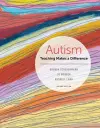
Autism
3 authors - Paperback
£78.99
Jo Webber is a Distinguished Professor Emerita of Special Education at Texas State University in San Marcos, Texas, where she established and served as Director for the Career Alternatives in Special Education (CASE) Program and Texas Educators for Students with Autism (TESA) Program. She founded and directed the Clinic for Autism Research, Evaluation, and Support (CARES) and served as Associate Dean for the College of Education. She currently serves on the Executive Board of the Autism Treatment Centers of Texas and the Autism Society of Texas and consults statewide with schools and advocacy groups. In addition to this text, Dr. Webber has co-authored two books: EDUCATING STUDENTS WITH AUTISM: A QUICK START MANUAL (Webber and Scheuermann, 2008; Pro-Ed), and EMOTIONAL AND BEHAVIORAL DISORDERS: THEORY AND PRACTICE (Webber and Plotts, 2008; Pearson). She has written numerous articles pertaining to the education of students with autism and behavior disorders and remains dedicated to preparing outstanding teachers for students with disabilities. Brenda Scheuermann is Professor of Special Education and Coordinator of Graduate Programs in Behavioral Disorders/Positive Behavior Supports at Texas State University in San Marcos, Texas. In addition to this text, she has co-authored two textbooks: POSITIVE BEHAVIORAL SUPPORTS FOR THE CLASSROOM, 3rd Edition (Scheuermann and Hall, 2016; Pearson), and EDUCATING STUDENTS WITH AUTISM: A QUICK START MANUAL (Webber and Scheuermann, 2008; Pro-Ed). She has also authored numerous journal articles in the area of behavioral disorders and positive behavior supports (PBS). Dr. Scheuermann's primary research focus is in the extension of Applied Behavior Analysis and PBS principles and practices with at-risk youth, particularly in alternative education and residential settings. She provides technical assistance in these areas to school districts in Texas and other states, and provides technical assistance and evaluation for the Texas Juvenile Justice Department's PBIS initiative. Dr. Scheuermann has received over $7.2 million in federal and state grant and contracts funding for research and training in PBS. Jo Webber is a Distinguished Professor Emerita of Special Education at Texas State University in San Marcos, Texas, where she established and served as Director for the Career Alternatives in Special Education (CASE) Program and Texas Educators for Students with Autism (TESA) Program. She founded and directed the Clinic for Autism Research, Evaluation, and Support (CARES) and served as Associate Dean for the College of Education. She currently serves on the Executive Board of the Autism Treatment Centers of Texas and the Autism Society of Texas and consults statewide with schools and advocacy groups. In addition to this text, Dr. Webber has co-authored two books: EDUCATING STUDENTS WITH AUTISM: A QUICK START MANUAL (Webber and Scheuermann, 2008; Pro-Ed), and EMOTIONAL AND BEHAVIORAL DISORDERS: THEORY AND PRACTICE (Webber and Plotts, 2008; Pearson). She has written numerous articles pertaining to the education of students with autism and behavior disorders and remains dedicated to preparing outstanding teachers for students with disabilities. Russell Lang co-authored the text EARLY INTERVENTION FOR YOUNG CHILDREN WITH AUTISM SPECTRUM DISORDER (Lang, Hancock, and Singh, 2016; Springer) and has published over 150 peer-reviewed articles and book chapters focused on the education and treatment of people with intellectual and developmental disabilities. He is an associate editor for the Journal of Child and Family Studies, Journal of Developmental and Physical Disabilities, and Advances in Neurodevelopmental Disorders and is a former co-editor-in-chief of Developmental Neurorehabilitation. Currently, Dr. Lang is the executive director of the Clinic for Autism Research, Evaluation and Support (CARES), where his research agenda involves the application of Applied Behavior Analysis to remediate challenging behavior and teach play skills to children with autism.